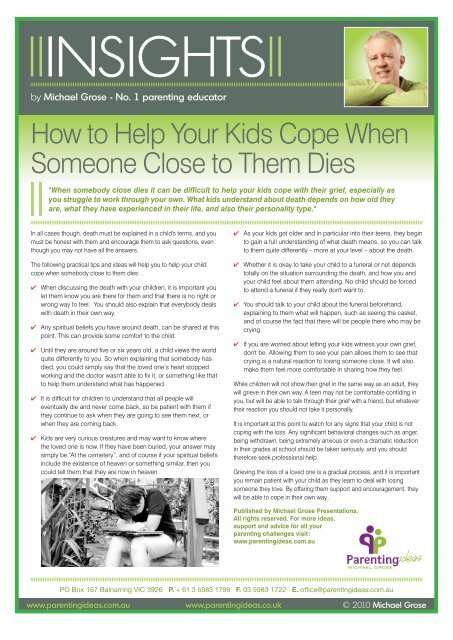2. - Holy Spirit College
2. - Holy Spirit College
2. - Holy Spirit College
You also want an ePaper? Increase the reach of your titles
YUMPU automatically turns print PDFs into web optimized ePapers that Google loves.
||INSIGHTS||<br />
by Michael Grose - No. 1 parenting educator<br />
How to Help Your Kids Cope When<br />
Someone Close to Them Dies<br />
"When somebody close dies it can be difficult to help your kids cope with their grief, especially as<br />
you struggle to work through your own. What kids understand about death depends on how old they<br />
are, what they have experienced in their life, and also their personality type."<br />
In all cases though, death must be explained in a child's terms, and you<br />
must be honest with them and encourage them to ask questions, even<br />
though you may not have all the answers.<br />
The following practical tips and ideas will help you to help your child<br />
cope when somebody close to them dies:<br />
✔✔ When discussing the death with your children, it is important you<br />
let them know you are there for them and that there is no right or<br />
wrong way to feel. You should also explain that everybody deals<br />
with death in their own way.<br />
✔✔ Any spiritual beliefs you have around death, can be shared at this<br />
point. This can provide some comfort to the child.<br />
✔✔ Until they are around five or six years old, a child views the world<br />
quite differently to you. So when explaining that somebody has<br />
died, you could simply say that the loved one’s heart stopped<br />
working and the doctor wasn't able to fix it, or something like that<br />
to help them understand what has happened.<br />
✔✔ It is difficult for children to understand that all people will<br />
eventually die and never come back, so be patient with them if<br />
they continue to ask when they are going to see them next, or<br />
when they are coming back.<br />
✔✔ Kids are very curious creatures and may want to know where<br />
the loved one is now. If they have been buried, your answer may<br />
simply be “At the cemetery”, and of course if your spiritual beliefs<br />
include the existence of heaven or something similar, then you<br />
could tell them that they are now in heaven.<br />
✔✔ As your kids get older and in particular into their teens, they begin<br />
to gain a full understanding of what death means, so you can talk<br />
to them quite differently – more at your level – about the death.<br />
✔✔ Whether it is okay to take your child to a funeral or not depends<br />
totally on the situation surrounding the death, and how you and<br />
your child feel about them attending. No child should be forced<br />
to attend a funeral if they really don't want to.<br />
✔✔ You should talk to your child about the funeral beforehand,<br />
explaining to them what will happen, such as seeing the casket,<br />
and of course the fact that there will be people there who may be<br />
crying.<br />
✔✔ If you are worried about letting your kids witness your own grief,<br />
don't be. Allowing them to see your pain allows them to see that<br />
crying is a natural reaction to losing someone close. It will also<br />
make them feel more comfortable in sharing how they feel.<br />
While children will not show their grief in the same way as an adult, they<br />
will grieve in their own way. A teen may not be comfortable confiding in<br />
you, but will be able to talk through their grief with a friend, but whatever<br />
their reaction you should not take it personally.<br />
It is important at this point to watch for any signs that your child is not<br />
coping with the loss. Any significant behavioral changes such as anger,<br />
being withdrawn, being extremely anxious or even a dramatic reduction<br />
in their grades at school should be taken seriously, and you should<br />
therefore seek professional help.<br />
Grieving the loss of a loved one is a gradual process, and it is important<br />
you remain patient with your child as they learn to deal with losing<br />
someone they love. By offering them support and encouragement, they<br />
will be able to cope in their own way..<br />
Published by Michael Grose Presentations.<br />
All rights reserved. For more ideas,<br />
support and advice for all your<br />
parenting challenges visit :<br />
www.parentingideas.com.au<br />
PO Box 167 Balnarring VIC 3926 P. + 61 3 5983 1798 F. 03 5983 1722 E. office@parentingideas.com.au<br />
www.parentingideas.com.au www.parentingideas.co.uk<br />
© 2010 Michael Grose

















